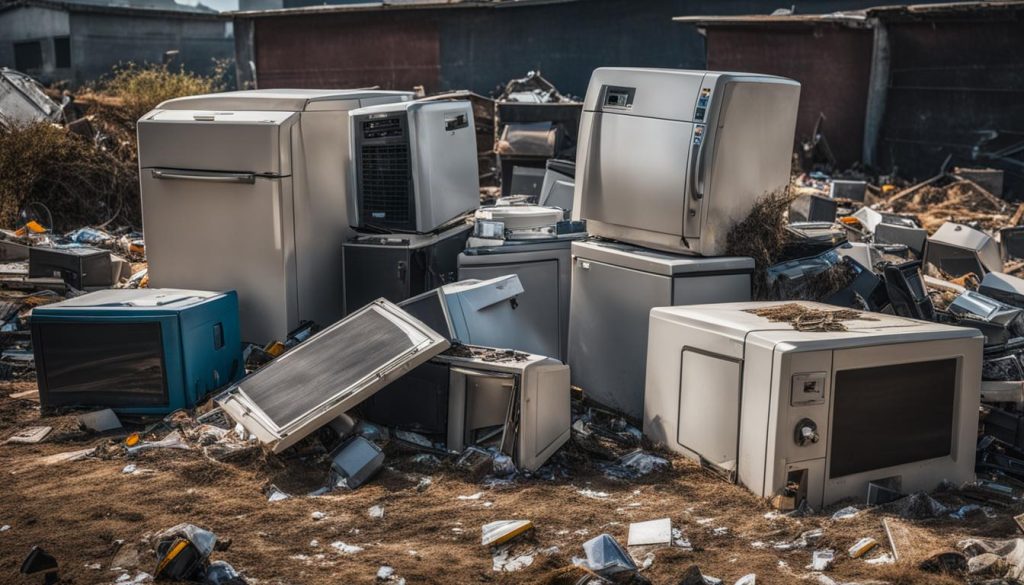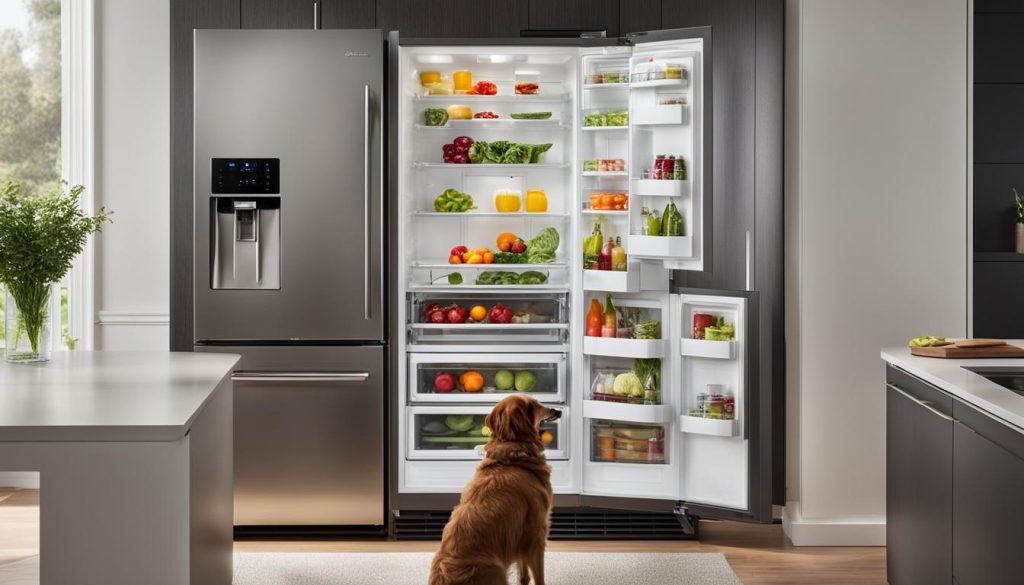A broken refrigerator can be a major inconvenience, but it can also be a significant expense. When facing a malfunctioning refrigerator, you may find yourself questioning whether it’s cheaper to fix it or replace it altogether. In this article, we will explore the cost considerations of repairing a refrigerator versus purchasing a new one, helping you make an informed decision.
Key Takeaways:
- Repairing a refrigerator may be more cost-effective for minor issues or newer appliances.
- Replacing a refrigerator may be necessary if the repair costs are high or the appliance is nearing the end of its life.
- The decision ultimately depends on specific circumstances and your budget.
Cost of Refrigerator Repairs
When your refrigerator breaks down, one of the first things you’ll consider is how much the repair will cost. Several factors can influence the repair costs, including the type of repair needed, the age of the refrigerator, and the availability of replacement parts.
The most common types of refrigerator repairs include replacing the compressor, fixing the condenser fan motor, or repairing the thermostat. The cost of these repairs can vary significantly depending on the make and model of your refrigerator, as well as the severity of the issue.
If your refrigerator is relatively new, it may be under warranty, meaning that the repair costs will be covered by the manufacturer. However, if your appliance is older, you may need to pay for the repairs out of pocket.
It’s important to keep in mind that some repairs may not be worth the cost, especially if your refrigerator is older and more likely to break down again shortly. In some cases, it may make more sense to purchase a new refrigerator rather than spending money on repairs.
“Repair costs can vary widely depending on the issue, the make and model of the refrigerator, and your location. It’s important to weigh the costs against the age and condition of your appliance when deciding whether to repair or replace.”
Lifespan of a Refrigerator
A refrigerator is an essential appliance in any household, but like any electronic device, it has a limited lifespan. Knowing how long a refrigerator is expected to last can help you make an informed decision about whether to repair or replace it.
The average lifespan of a refrigerator is around 10-15 years, depending on various factors. However, with proper maintenance and regular cleaning, it can last longer.
The lifespan of a refrigerator depends on several factors such as the make and model, usage, and whether or not it is well-maintained. For instance, top-of-the-line refrigerators tend to last longer than budget-friendly models. Similarly, refrigerators that are used less frequently last longer than those used more frequently.
Another factor that affects the lifespan of a refrigerator is how well it is maintained. Regular cleaning, keeping the condenser coils free of dust and debris, and replacing broken or worn-out parts promptly can extend the life of a refrigerator.
Signs that Indicate Your Refrigerator Might Need Replacing
While regular maintenance can keep your refrigerator running efficiently for years, certain signs indicate it might be time to replace it. Some of the signs to look for are:
- The refrigerator is more than 10-15 years old
- The refrigerator is making unusual noises
- The refrigerator is not maintaining the right temperature
- The refrigerator requires frequent repairs
- The energy bills are increasing despite no changes in usage
If you notice any of the above signs, it might be time to replace your refrigerator.
“Proper maintenance and care can help extend the life of a refrigerator, but eventually, every refrigerator has to be replaced.”
Advantages of Repairing a Refrigerator
If your refrigerator has encountered a minor issue, fixing it can be a cost-effective option. The cost of repairing a refrigerator is usually lower than the cost of buying a new one, especially if the repair is relatively simple.
“Repairing a faulty refrigerator can save you hundreds of dollars compared to buying a replacement. It is a sensible choice for individuals on a tight budget.”
Additionally, repairing your refrigerator is an eco-friendly choice. By fixing a broken refrigerator instead of replacing it, you are reducing your carbon footprint. The production and transportation of new appliances contribute significantly to carbon emissions, which can negatively impact the environment.
Finally, repairing your refrigerator can extend its lifespan. Regular maintenance and timely repairs can keep your refrigerator running smoothly for years to come. By fixing minor issues early on, you can prevent more severe problems from developing and safeguard your investment.
Disadvantages of Repairing a Refrigerator
While repairing a refrigerator can be a cost-effective option, there are situations where it may not be the most practical choice. Let’s explore some of the drawbacks of repairing a refrigerator:
- High repair costs: If the repair costs are close to the price of a new refrigerator, it may be more practical to buy a replacement.
- Frequent breakdowns: If your refrigerator has a history of frequent breakdowns, repairing it may not be worth it in the long run.
- Age of the refrigerator: If your refrigerator is nearing the end of its lifespan, repairing it may only provide a temporary solution. You may soon face another breakdown, forcing you to repair it again or replace it.
- Obsolete parts: If your refrigerator is an older model, finding replacement parts may be difficult or impossible. This may increase the repair time and costs or make repairs impossible.
It’s essential to weigh the potential drawbacks of repairing your refrigerator against the benefits. In some cases, it may make more sense to replace it instead.

Cost of buying a new refrigerator
When considering buying a replacement refrigerator, the cost is a significant factor to keep in mind. The price of a new refrigerator can vary depending on various features such as size, style, brand, and energy efficiency. Generally, a basic top-freezer refrigerator can cost between CAD 400 to CAD 1,000, while a french-door style refrigerator with additional features can range from CAD 1,500 to CAD 4,000.
If you are looking for an energy-efficient model with additional features such as a water dispenser or smart technology, the cost can increase to CAD 5,000 or more. Keep in mind that the cost of a new refrigerator can also increase if you need to pay for delivery, installation, and the removal of your old appliance.
Overall, the price of a new refrigerator can be a significant investment, but it can be worth the cost for the improved features, energy efficiency, and longer lifespan.
Advantages of Buying a New Refrigerator
Investing in a new refrigerator comes with several benefits that make it a worthwhile decision. Here are some advantages of buying a new refrigerator:
- Improved energy efficiency: Newer refrigerators are designed to consume less energy, which makes them more energy-efficient and cost-effective in the long run. For instance, the LG InstaView Door-in-Door model boasts an Energy Star rating and uses up to 20% less energy than older models.
- Warranty Coverage: When you purchase a new refrigerator, you typically receive a manufacturer’s warranty that covers repairs or replacements within a specific period. This warranty provides peace of mind by protecting your investment if your refrigerator malfunctions or fails.
- Opportunity to upgrade: Newer refrigerators offer a range of modern features and technologies that make them more convenient and user-friendly. The Samsung French Door Refrigerator, for instance, features a water dispenser that can be easily accessed from the outside and a FlexZone drawer that can be adjusted to different temperature settings.
By upgrading to a new refrigerator, you can enjoy these benefits and more.
Disadvantages of Buying a New Refrigerator
While purchasing a new refrigerator might seem like the more convenient choice, it comes with its fair share of disadvantages. Here are some of the reasons why you might want to hold off on replacing your appliance:
- Upfront costs: Buying a new refrigerator is a significant investment, and the upfront costs can be quite high. Depending on the model, size, and features you choose, you could end up spending thousands of dollars.
- Delivery and installation: Once you have purchased your new refrigerator, you will need to schedule a delivery and installation appointment. This can be inconvenient and time-consuming, especially if you have to take time off work to be present.
- Environmental impact: Replacing a perfectly good refrigerator can hurt the environment. The manufacturing process of new appliances requires natural resources and energy, and the old appliances will need to be disposed of properly to minimize harm.
Ultimately, the decision to repair or replace your refrigerator depends on your specific circumstances. By weighing the advantages and disadvantages of each option, you can make an informed decision that suits your budget, lifestyle, and environmental values.
Conclusion
In conclusion, choosing between repairing a refrigerator or buying a new one requires careful consideration of various factors.
Determine the Cost of Refrigerator Repairs
Before making a decision, it is important to determine the cost of refrigerator repairs. If the repair costs are minor and the appliance is relatively new, repairing it may be a cost-effective option. On the other hand, if the repair costs are close to or higher than the price of a new refrigerator, replacing it may be more practical.
Consider the Lifespan of the Refrigerator
Refrigerators have an average lifespan of about 10-15 years. If your refrigerator is nearing the end of its lifespan or has a history of frequent breakdowns, it may be time to consider buying a new one.
Weigh the Advantages and Disadvantages
Additionally, it is important to weigh the advantages and disadvantages of each option. Repairing a refrigerator can be a cost-effective and environmentally friendly choice, but it may not always be practical. Buying a new refrigerator provides the opportunity to upgrade to modern features and technologies, but it comes with a higher upfront cost and potential inconveniences.
Ultimately, the decision on whether to fix or replace a refrigerator depends on your specific circumstances and budget. If your fridge needs fixing, it’s crucial to enlist the services of a skilled professional. A qualified technician can efficiently diagnose and address the issue, ensuring a prompt and effective solution to get your refrigerator back in working order.

Written by Max | An appliance repair technician with more than 15 years experience in appliance repair services in Toronto and the GTA.
Disclaimer: This post "Is it Cheaper to Fix a Refrigerator or Buy a New One?" is for information purposes only. If you need specific help, please contact Max Appliance Repair at https://www.maxappliancerepair.ca/contact/.